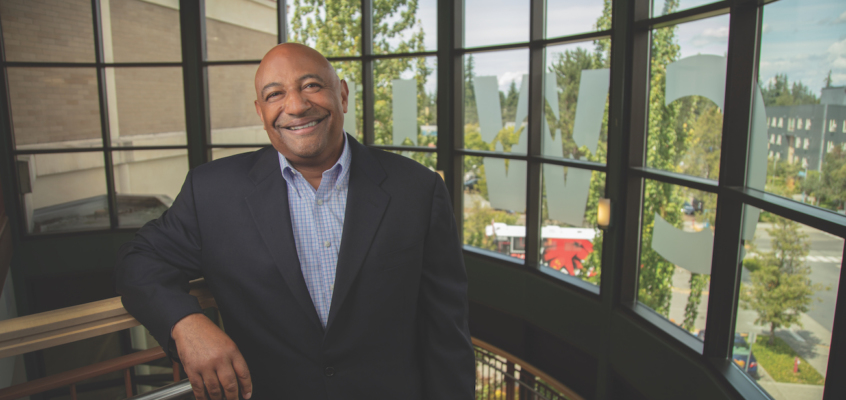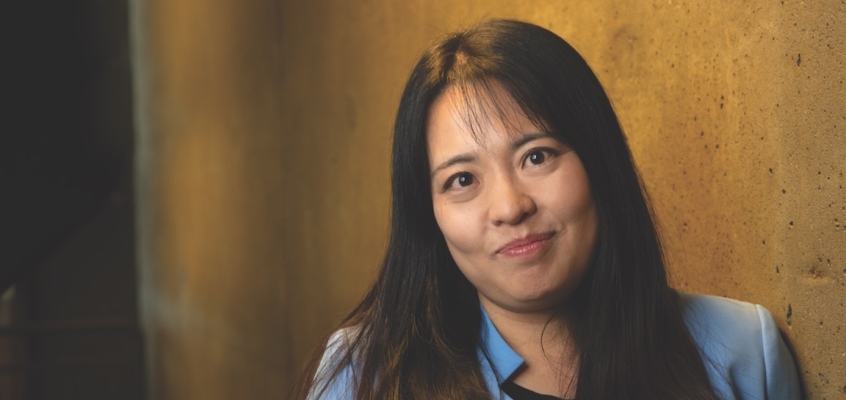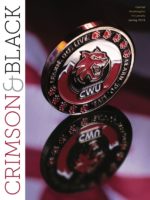
Alena Yastchenko puts in a lot of miles for her job. The CWU psychology professor supervises the Interdisciplinary Studies-Social Studies program in Ellensburg and at University Centers in Moses Lake, Wenatchee, and Yakima.
It can be a long haul, but she doesn’t mind. In fact, while traveling is a big part of her vocation, it is also her avocation, especially by motorcycle. Her current favorite bike is a Russian-made motorcycle-sidecar combination.
“It’s a behemoth (750 cubic centimeters or about 160 horsepower). It doesn’t have the modern equipment,” Yastchenko explained with a laugh. “They designed them in 1936 and they haven’t changed much.”

Yastchenko (Experimental Psychology, '99) and her husband Dave Woody.
Yastchenko, who also oversees program curriculum online for all centers, said each University Center has its own personality and culture.
“We have students with vastly different resources and demands on their time,” she said. “They are much more likely to have a full-time job—or a job-and-a-half. I know how precious their time is, so I make sure they understand that the assigned work is clearly connected to the learning objectives of the course, that I value their time, and do not assign any busy work.
“My goal is to equip students with the tools they need to accomplish more and experience more enjoyment in their jobs, and to facilitate their professional and personal development,” she continued.
A native of St. Petersburg, Russia, she came to the United States as an international exchange student, after beginning her studies at St. Petersburg State University.
Eventually arriving at CWU, she earned undergraduate and graduate degrees in experimental psychology with an emphasis on applied behavior analysis and clinical psychology. Going full circle in her educational career, Yastchenko earned her PhD from St. Petersburg State.
After she earned her undergraduate degree at CWU, she began her professional career at Service Alternatives, working at a residential home for children with autism and other developmental disorders. She still serves as a clinical consultant and develops training curricula for the agency.
“It helps me stay connected with the work and the professionals that are doing the work,” she said of those efforts. “I have always been a practitioner in the field of mental health, so when I teach my students, I can bring that practical, current experience with me.”
She has additional practical experience working with rescued basset hounds. It’s an area in which her expertise also plays a role.
“They are very strong-willed and independent, and notoriously misunderstood as being stubborn and difficult to train,” said Yastchenko, who has adopted seven basset hounds over the years. “They’re just assertive and have strong personalities. I have been able to rescue animals that other people say cannot be trained. I can say that I have the professional and educational background that allows me to give it a try.”

Anderson Parks at CWU-Lynnwood, co-located on the Edmonds Community College Campus.
From Coca-Cola to the Classroom
Anderson Parks came to CWU by way of Chicago, Los Angeles, New York, Atlanta and other cities, where he spent time during a long career with the Coca-Cola Company.
“I am now living my passion,” said Parks, a CWU-Lynnwood marketing and management professor. That passion comes from passing along what he learned during his corporate career to his students.
Parks became aware of what inspires him most when he was diagnosed with early-stage prostate cancer in 2007, “right after I took a new [global account director] position with Coke,” he said. “I was very successful, making good money, had all the titles and the accolades but, after my cancer diagnosis, I became aware of my passion and allowed it to drive me.”
Successful cancer treatment followed, along with Parks’s determination to transition away from the lucrative, yet time-consuming, corporate world to cement his legacy.
After guest lecturing at Bellevue College and teaching at Edmonds Community College, Parks began teaching a marketing and management course at CWU.
“I loved it,” he said. “I was having so much fun teaching that I decided, since I was eligible [to do so], I would retire from Coke at age 55 and go into teaching full time.”
His teaching incorporates his experience from leading strategic management, marketing, and planning for Coca-Cola’s largest global corporate customers—including Costco—throughout Europe, Latin America, and the Pacific Rim.
“One of the courses that I teach now is on global leadership and culture,” Parks pointed out. “So, I bring in a lot of examples from that position into that course in particular.”
Many of Parks’s classes are taught online, an area where his professional experience pays significant dividends.
“Since I worked in a global role, a lot of my interactions with my team and colleagues were done in an online environment,” he said. “I try to replicate that same format in my classroom settings. In most of my online classes, we have group work, group presentations, and conference calls—things the students will experience after they graduate.”
Based on his personal experience, Parks also emphasizes to his students that they learn the importance of self-awareness, which he incorporates into all of his classes.
“We do a lot of assessments around communication styles, conflict resolution, personality types, and ways students can take their basic makeup and leverage it to work in more collaborative ways with their teams,” he said.

Se Eun Lee at CWU-Des Moines, co-located at Highline College.
Training Leaders in a Global Industry
Collaboration and teamwork are critical in hospitality and tourism—the largest industry in the world. Se Eun Lee, an industry veteran herself, now leads the university’s newly revised Hospitality, Tourism, and Events program at CWU-Des Moines.
“There are millions of jobs available in nearly every corner of the globe, including in the Seattle area,” she said. “But bachelor’s degrees, like ours, are needed for many of the management positions.”
She lists jobs—especially for those earning degrees—as being available with airlines, cruise lines, hotels, food and beverage, and with marketing organizations, such as chambers of commerce, convention centers, and visitor bureaus. Hospitality and tourism also incorporate the world’s highest number of entrepreneurs.
“So, anyone who is seeking a career in business should investigate a degree in hospitality,” she said. “When our students graduate, the globe opens up to their wildest dreams.”
The Seattle area has become a hospitality hotbed, with 50 million passengers a year traveling through Seattle-Tacoma International Airport. There are about 450 hotels in the Puget Sound area, while cruise lines there serve more than a million passengers every year. That proliferation of tourist activity can provide CWU students with endless opportunities for hands-on learning, Lee said.
“Because of that, CWU-Des Moines is in a great location,” Lee added. “It will allow for hands-on learning in a student’s area of emphasis. That is more important than textbook knowledge.”
Lee has studied hospitality and tourism on three continents. A native of Seoul, South Korea, she completed her undergraduate degree there, earned a master’s degree in England, and her PhD in the United States.
“I like learning about cultures and connecting with people,” she said. “Obviously, this is critical for tourism and hospitality professionals. I believe these global experiences are assisting me a great deal.”
Her experience includes work in destination marketing organizations and large-event management. She started teaching at Highline Community College, then moved to Slippery Rock University in Pennsylvania. She returned to Washington and joined the CWU faculty.
“It was fortunate for me that there was an opportunity at Central,” she said. “I’m very excited and challenged. I know the success of this program will depend on how I manage it.”

Luke Williams at CWU-Pierce County, co-located at Pierce College Ford Steilacoom in Lakewood.
Blending Technology with Business
Management is something familiar to Luke Williams, CWU-Pierce County professor of information technology and administrative management (ITAM). He spent 15 years in different management and sales positions, including selling to Amazon, Expedia, Microsoft, and the Los Angeles Angels Major League Baseball team.
“After getting burned out on the hours and the travel, I was looking for a lifestyle change,” he said. “I learned about the Central ITAM program, how it blends technology with business, and realized that it was a perfect fit for my background. Even though I had never really considered teaching as a career, I really enjoy it.”
As an undergraduate, Williams studied computer information systems, including six months at the University of Oxford near London, where he was taught by some of Britain’s top experts in computer science, foreign policy, and international business. He later added a master’s in business administration.
In addition to his experience in the private sector, Williams draws on his family history.
“I am the third generation of a family of real estate investors,” he said. “I was raised in an entrepreneurial home environment from a young age.”
He now teaches classes from introduction to business to customer relationship management (CRM).
“CRM is one of the hottest areas of our program,” Williams added. “It helps students make sense of technology in the world, and how companies make customers feel valued in order to build brand loyalty.”
Williams notes many of his students—from single parents to military veterans—are “retooling their life skills.”
“They recognize that there are jobs in technology, and that they need to be positioned with business-technology knowledge so that they can be competitive in the workplace,” he said.
It’s a continuous learning process for Williams, too.
“I don’t have all the answers but, sometimes, coming up with the right questions is just as important,” he said. “I want to help my students ask better questions and get more excited about lifelong learning. If you stop learning today, you’ll be irrelevant in five years—probably more like five months in the high-tech industry.”



comments powered by Disqus